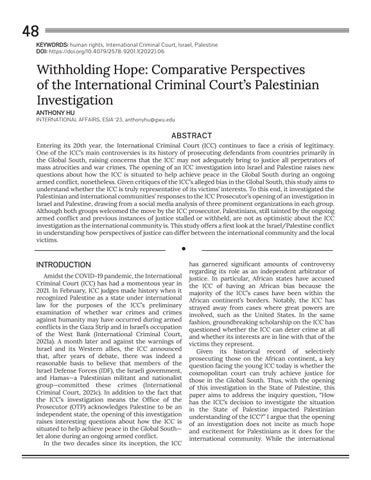48 KEYWORDS: human rights, International Criminal Court, Israel, Palestine DOI: https://doi.org/10.4079/2578-9201.1(2022).06
Withholding Hope: Comparative Perspectives of the International Criminal Court’s Palestinian Investigation ANTHONY HU
INTERNATIONAL AFFAIRS, ESIA ‘23, anthonyhu@gwu.edu
ABSTRACT Entering its 20th year, the International Criminal Court (ICC) continues to face a crisis of legitimacy. One of the ICC’s main controversies is its history of prosecuting defendants from countries primarily in the Global South, raising concerns that the ICC may not adequately bring to justice all perpetrators of mass atrocities and war crimes. The opening of an ICC investigation into Israel and Palestine raises new questions about how the ICC is situated to help achieve peace in the Global South during an ongoing armed conflict, nonetheless. Given critiques of the ICC’s alleged bias in the Global South, this study aims to understand whether the ICC is truly representative of its victims’ interests. To this end, it investigated the Palestinian and international communities’ responses to the ICC Prosecutor’s opening of an investigation in Israel and Palestine, drawing from a social media analysis of three prominent organizations in each group. Although both groups welcomed the move by the ICC prosecutor, Palestinians, still tainted by the ongoing armed conflict and previous instances of justice stalled or withheld, are not as optimistic about the ICC investigation as the international community is. This study offers a first look at the Israel/Palestine conflict in understanding how perspectives of justice can differ between the international community and the local victims.
•
INTRODUCTION Amidst the COVID-19 pandemic, the International Criminal Court (ICC) has had a momentous year in 2021. In February, ICC judges made history when it recognized Palestine as a state under international law for the purposes of the ICC’s preliminary examination of whether war crimes and crimes against humanity may have occurred during armed conflicts in the Gaza Strip and in Israel’s occupation of the West Bank (International Criminal Court, 2021a). A month later and against the warnings of Israel and its Western allies, the ICC announced that, after years of debate, there was indeed a reasonable basis to believe that members of the Israel Defense Forces (IDF), the Israeli government, and Hamas—a Palestinian militant and nationalist group—committed these crimes (International Criminal Court, 2021c). In addition to the fact that the ICC’s investigation means the Office of the Prosecutor (OTP) acknowledges Palestine to be an independent state, the opening of this investigation raises interesting questions about how the ICC is situated to help achieve peace in the Global South— let alone during an ongoing armed conflict. In the two decades since its inception, the ICC
has garnered significant amounts of controversy regarding its role as an independent arbitrator of justice. In particular, African states have accused the ICC of having an African bias because the majority of the ICC’s cases have been within the African continent’s borders. Notably, the ICC has strayed away from cases where great powers are involved, such as the United States. In the same fashion, groundbreaking scholarship on the ICC has questioned whether the ICC can deter crime at all and whether its interests are in line with that of the victims they represent. Given its historical record of selectively prosecuting those on the African continent, a key question facing the young ICC today is whether the cosmopolitan court can truly achieve justice for those in the Global South. Thus, with the opening of this investigation in the State of Palestine, this paper aims to address the inquiry question, “How has the ICC’s decision to investigate the situation in the State of Palestine impacted Palestinian understanding of the ICC?” I argue that the opening of an investigation does not incite as much hope and excitement for Palestinians as it does for the international community. While the international







